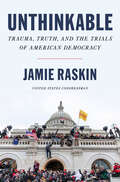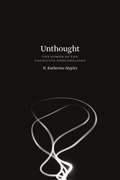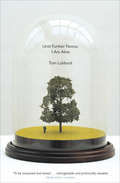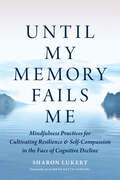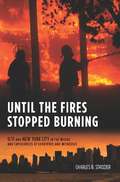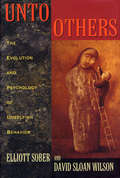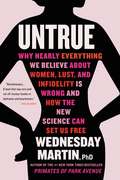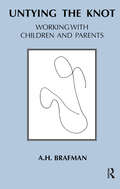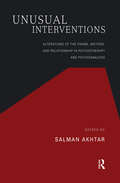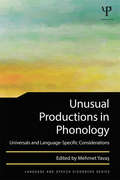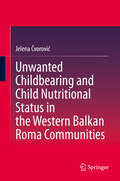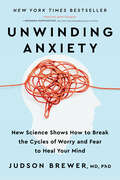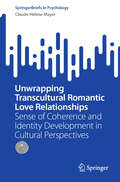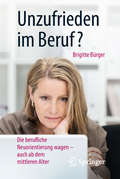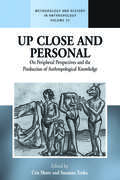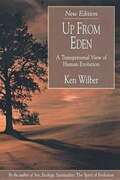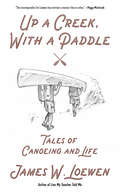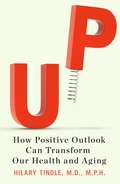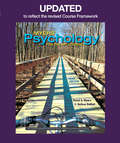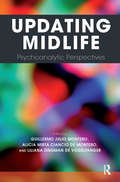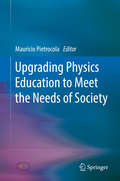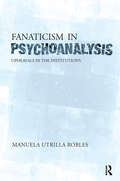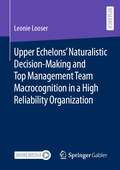- Table View
- List View
Unthinkable: Trauma, Truth, and the Trials of American Democracy
by Jamie RaskinIn this searing memoir, Congressman Jamie Raskin tells the story of the forty-five days at the start of 2021 that permanently changed his life—and his family’s—as he confronted the painful loss of his son to suicide, lived through the violent insurrection in our nation’s Capitol, and led the impeachment effort to hold President Trump accountable for inciting the political violence. <p><p> On December 31, 2020, Tommy Raskin, the only son of Maryland Congressman Jamie Raskin, tragically took his own life after a long struggle with depression. Seven days later on January 6, Congressman Raskin returned to Congress to help certify the 2020 Presidential election results, when violent insurrectionists led by right wing extremist groups stormed the U.S. Capitol hoping to hand four more years of power to President Donald Trump. <p><p> As our reeling nation mourned the deaths of numerous people and lamented the injuries of more than 140 police officers hurt in the attack, Congressman Raskin, a Constitutional law professor, was called upon to put aside his overwhelming grief—both personal and professional—and lead the impeachment effort against President Trump for inciting the violence. Together this nine-member team of House impeachment managers riveted a nation still in anguish, putting on an unprecedented Senate trial that produced the most bipartisan Presidential impeachment vote in American history. <p><p> Now for the first time, Congressman Raskin discusses this unimaginable convergence of personal and public trauma, detailing how the painful loss of his son and the power of Tommy’s convictions fueled the Congressman’s work in the aftermath of modern democracy’s darkest day. Going inside Congress on January 6, he recounts the horror of that day, a day that he and other Democrats had spent months preparing for under the correct assumption that they would encounter an attempted electoral coup—not against a President but for one. And yet, on January 6, he faced the one thing he had failed to anticipate: mass political violence designed to block Biden’s election. <p><p> With an inside account of leading the team prosecuting President Trump in the Senate, Congressman Raskin shares never before told stories of just how close we came to losing our democracy that fateful day and lays out the methodical prosecution that convinced Democrats and Republicans alike of Trump’s responsibility for inciting insurrectionary violence against our government. <p><p> Through it all, he reckons with the loss of his brilliant, remarkable son, a Harvard Law student whose values and memory continually inspired the Congressman to confront the dark impulses unleashed by Donald Trump. At turns, a moving story of a father coping with his pain and a revealing examination of holding President Trump accountable for the violence he fomented, this book is a vital reminder of the ongoing struggle for the soul of American democracy and the perseverance that our Constitution demands from us all.
Unthought: The Power of the Cognitive Nonconscious
by N. Katherine HaylesN. Katherine Hayles is known for breaking new ground at the intersection of the sciences and the humanities. In Unthought, she once again bridges disciplines by revealing how we think without thinking—how we use cognitive processes that are inaccessible to consciousness yet necessary for it to function. Marshalling fresh insights from neuroscience, cognitive science, cognitive biology, and literature, Hayles expands our understanding of cognition and demonstrates that it involves more than consciousness alone. Cognition, as Hayles defines it, is applicable not only to nonconscious processes in humans but to all forms of life, including unicellular organisms and plants. Startlingly, she also shows that cognition operates in the sophisticated information-processing abilities of technical systems: when humans and cognitive technical systems interact, they form “cognitive assemblages”—as found in urban traffic control, drones, and the trading algorithms of finance capital, for instance—and these assemblages are transforming life on earth. The result is what Hayles calls a “planetary cognitive ecology,” which includes both human and technical actors and which poses urgent questions to humanists and social scientists alike. At a time when scientific and technological advances are bringing far-reaching aspects of cognition into the public eye, Unthought reflects deeply on our contemporary situation and moves us toward a more sustainable and flourishing environment for all beings.
Until Further Notice, I Am Alive
by Tom Lubbock&“These are thoughts for us all, sooner or later—and this is a book I'll keep with me, as long as I live.&”—David Sexton, The Scotsman In 2008, art critic Tom Lubbock was diagnosed with a rare brain tumor and told he had only two years to live. Physically fit and healthy, and suffering from few symptoms, he faced his death with the same directness and courage that had marked the rest of his life. Lubbock was renowned for the clarity and unconventionality of his writing, and his characteristic fierce intelligence permeates this extraordinary chronicle. With unflinching honesty and curiosity, he repeatedly turns over the fact of his mortality, as he wrestles with the paradoxical question of how to live, knowing we&’re going to die. Defying the initial diagnosis, Tom survived for three years. He savored his remaining days; engaging with books, art, friends, his wife and their young son, while trying to stay focused on the fact of his impending death. There are medical details—he vividly describes the slow process of losing control over speech as the tumor gradually pressed down on the area of his brain responsible for language—but this is much more than a book about illness; rather, it's a book about a man who remains in thrall to life, as he inches closer to death. &“I hope that if I am ever diagnosed with a terminal illness I will remember to reread Until Further Notice, I Am Alive. It is, in its tough-minded way, truly joyous.&”—Lynn Barber, Sunday Times
Until My Memory Fails Me: Mindfulness Practices for Cultivating Resilience and Self-Compassion in the Face of Cognitive Decline
by Sharon LukertA definitive guide for navigating cognitive decline using mindfulness and meditation practices that includes practical advice and poignant stories from a Buddhist chaplain diagnosed with Mild Cognitive Impairment.When Buddhist chaplain Sharon Lukert was diagnosed with Mild Cognitive Impairment (MCI), she turned to spiritual practice and community to help her adjust to a new and ever-shifting reality. In Until My Memory Fails Me, she shares her hard-won wisdom as a guide for anyone standing at the gateway of cognitive decline.Through poignant storytelling and practical wisdom, Lukert offers specific ways to build resilience against the emotional swings and existential fear inherent in cognitive decline. The book includes:Instructions for more than a dozen mindfulness and meditation exercises, including The Handshake, Just Like Me, Open Awareness Meditation, and Tonglen (Lovingkindness) MeditationPractical advice on topics like understanding your diagnosis, how to talk to your medical providers, testing, dealing with bias, how to maintain communication, and managing new symptomsStories, advice, and encouragement from her peers in the MCI community and her &“dementia ancestors,&” those she worked with in her decades as a Buddhist chaplain in healthcare settingsWith raw vulnerability, Lukert demonstrates how to find courage, acceptance, and compassion even as your sense of self shifts underneath you.The first mindfulness book written specifically for people with MCI, the practices and lessons Lukert shares are also valuable for anyone experiencing cognitive decline caused by other disorders, as well as for loved ones and caregivers.
Until the Fires Stopped Burning: 9/11 and New York City in the Words and Experiences of Survivors and Witnesses
by Charles StrozierCharles B. Strozier's college lost sixty-eight alumni in the tragedy of 9/11, and the many courses he has taught on terrorism and related topics since have attracted dozens of survivors and family members. A practicing psychoanalyst in Manhattan, Strozier has also accepted many seared by the disaster into his care. In some ways, the grief he has encountered has felt familiar; in other ways, unprecedented. Compelled to investigate its unique character further, he launched a fascinating study into the conscious and unconscious meaning of the event, both for those who were physically close to the attack and for those who witnessed it beyond the immediate space of Ground Zero.Based on the testimony of survivors, bystanders, spectators, and victim's friends and families, Until the Fires Stopped Burning brings much-needed clarity to the conscious and unconscious meaning of 9/11 and its relationship to historical disaster, apocalyptic experience, unnatural death, and the psychological endurance of trauma. Strozier interprets and contextualizes the memories of witnesses and compares their encounter with 9/11 to the devastation of Hiroshima, Auschwitz, Katrina, and other events Kai Erikson has called a "new species of trouble" in the world. Organizing his study around "zones of sadness" in New York, Strozier powerfully evokes the multiple places in which his respondents confronted 9/11 while remaining sensitive to the personal, social, and cultural differences of these experiences. Most important, he distinguishes between 9/11 as an apocalyptic event (which he affirms it is not;rather, it is a monumental event), and 9/11 as an apocalyptic experience, which is crucial to understanding the act's affect on American life and a still-evolving culture of fear in the world.
Unto Others: The Evolution and Psychology of Unselfish Behavior
by David Sloan Wilson Elliot SoberNo matter what we do, however kind or generous our deeds may seem, a hidden motive of selfishness lurks—or so science has claimed for years. This book, whose publication promises to be a major scientific event, tells us differently. In Unto Others philosopher Elliott Sober and biologist David Sloan Wilson demonstrate once and for all that unselfish behavior is in fact an important feature of both biological and human nature. Their book provides a panoramic view of altruism throughout the animal kingdom—from self-sacrificing parasites to insects that subsume themselves in the superorganism of a colony to the human capacity for selflessness—even as it explains the evolutionary sense of such behavior. Explaining how altruistic behavior can evolve by natural selection, this book finally gives credence to the idea of group selection that was originally proposed by Darwin but denounced as heretical in the 1960s. With their account of this controversy, Sober and Wilson offer a detailed case study of scientific change as well as an indisputable argument for group selection as a legitimate theory in evolutionary biology. Unto Others also takes a novel evolutionary approach in explaining the ultimate psychological motives behind unselfish human behavior. Developing a theory of the proximate mechanisms that most likely evolved to motivate adaptive helping behavior, Sober and Wilson show how people and perhaps other species evolved the capacity to care for others as a goal in itself. A truly interdisciplinary work that blends biology, philosophy, psychology, and anthropology, this book will permanently change not just our view of selfless behavior but also our understanding of many issues in evolutionary biology and the social sciences.
Untrue: Why Nearly Everything We Believe About Women, Lust, and Infidelity Is Wrong and How the New Science Can Set Us Free
by Wednesday MartinFrom the #1 New York Times bestselling author of Primates of Park Avenue, a bold, timely reconsideration of female infidelity that will upend everything you thought you knew about women and sex.What do straight, married female revelers at an all-women's sex club in LA have in common with nomadic pastoralists in Namibia who bear children by men not their husbands? Like women worldwide, they crave sexual variety, novelty, and excitement. In ancient Greek tragedies, Netflix series, tabloids and pop songs, we've long portrayed such cheating women as dangerous and damaged. We love to hate women who are untrue. But who are they really? And why, in this age of female empowerment, do we continue to judge them so harshly? In Untrue, feminist author and cultural critic Wednesday Martin takes us on a bold, fascinating journey to reveal the unexpected evolutionary legacy and social realities that drive female faithlessness, while laying bare our motivations to contain women who step out. Blending accessible social science and interviews with sex researchers, anthropologists, and real women from all walks of life, Untrue challenges our deepest assumptions about ourselves, monogamy, and the women we think we know. From recent data suggesting women may struggle more than men with sexual exclusivity to the revolutionary idea that females of many species evolved to be "promiscuous" to Martin's trenchant assertion that female sexual autonomy is the ultimate metric of gender equality, Untrue will change the way you think about women and sex forever.
Untying the Knot: Working with Children and Parents
by A.H. BrafmanUntying The Knot sets out to present a clinical approach to cases where the referred patient is a child or adolescent, but in which the parents are intimately involved in the therapeutic situation.Three fundamental principles inform the work: firstly, that early experience influences present lives; secondly, that unconscious feelings and fantasies are elements which shape everyday conscious experience; and thirdly, that the interaction of children and parents leads to patterns which become self-perpetuating and make it virtually impossible to define what is cause and what is effect in their relationship.Dr Brafman acknowledges the pioneering work of Donald Winnicott in the treatment of children, emphasizing particularly his refusal to be bound by rigid notions of treatment modalities, but instead to go to the heart of the matter - an understanding of the child's own confusion and pain, and then, through its elucidation and expression, to bring relief.
Unusual Interventions: Alterations of the Frame, Method, and Relationship in Psychotherapy and Psychoanalysis
by Salman AkhtarRadical departures from the set and familiar rules of technique often become necessary in the course of psychotherapy and psychoanalysis. These can include conducting a session outside the office, giving advice, not charging fees, talking about oneself, giving a gift to the patient, and so on. Such interventions have so far remained imbued with mystery or, worse, have been the staple of cocktail party conversations. Unusual Interventions brings a variety of exceptional measures together to highlight their indications, risks, and their potential anchors in psychoanalytic theory of human relatedness. In accomplishing this, the book itself becomes an unusual addition to the literature on the technique of psychotherapy and psychoanalysis.
Unusual Productions in Phonology: Universals and Language-Specific Considerations
by Mehmet YavasThe universalist view that acquisition of phonology is guided by universal principles has been the dominant position for decades. More recently, an alternative view has brought into focus the relationship between developmental markedness and language-specific input frequencies. With entirely original chapters on non-ambient-like productions by typically and atypically developing children, and second language learners, Unusual Productions in Phonology delves deeply into these competing explanations to show that patterns observed do not uniquely lend themselves to one or the other explanations. Rather, they point towards the need for both universal markedness and statistical input considerations in any attempted explanation. Containing contributions from leading researchers from around the world, this impressive collection is a must-have resource for any researcher, practitioner, or advanced student specializing in phonology, cognitive psychology, applied linguistics, and communication disorders.
Unwanted Childbearing and Child Nutritional Status in the Western Balkan Roma Communities
by Jelena ČvorovićThis book investigates the relationship between maternal investment, unwanted births, and child nutritional outcomes in five poor communities of the Western Balkan Roma. Based on an evolutionary approach, the book directly assesses variability in Roma mothers’ parental care using data from UNICEF Multiple Indicator Cluster Surveys 5 and 6 for the Roma settlements in Serbia, Montenegro, Kosovo, Macedonia, and Bosnia and Herzegovina. The book includes useful information about Roma communities in the Western Balkans and their history and sufferings in the region. It reviews this history against the data on unwanted childbearing globally and in low- and middle-income countries. It addresses concerns related to Roma people's integration into European society, despite their longstanding presence in Europe. The book analyses the existence of health differentials among Roma children themselves, suggesting that some children are especially vulnerable. Therefore, it critically assesses how multiple (levels of) vulnerabilities affect differential Roma parental investment in children. This book is a useful resource for researchers interested in Roma studies, children's well-being, wellbeing of marginal groups, social work and social justice.
Unwinding Anxiety: New Science Shows How to Break the Cycles of Worry and Fear to Heal Your Mind
by Judson BrewerA step-by-step plan clinically proven to break the cycle of worry and fear that drives anxiety and addictive habitsWe are living through one of the most anxious periods any of us can remember. Whether facing issues as public as a pandemic or as personal as having kids at home and fighting the urge to reach for the wine bottle every night, we are feeling overwhelmed and out of control. But in this timely book, Judson Brewer explains how to uproot anxiety at its source using brain-based techniques and small hacks accessible to anyone. We think of anxiety as everything from mild unease to full-blown panic. But it's also what drives the addictive behaviors and bad habits we use to cope (e.g. stress eating, procrastination, doom scrolling and social media). Plus, anxiety lives in a part of the brain that resists rational thought. So we get stuck in anxiety habit loops that we can't think our way out of or use willpower to overcome. Dr. Brewer teaches us map our brains to discover our triggers, defuse them with the simple but powerful practice of curiosity, and to train our brains using mindfulness and other practices that his lab has proven can work.Distilling more than 20 years of research and hands-on work with thousands of patients, including Olympic athletes and coaches, and leaders in government and business, Dr. Brewer has created a clear, solution-oriented program that anyone can use to feel better - no matter how anxious they feel.
Unwrapping Transcultural Romantic Love Relationships: Sense of Coherence and Identity Development in Cultural Perspectives (SpringerBriefs in Psychology)
by Claude-Hélène MayerThis research study explores the interlinkages of three major themes, namely transcultural romantic love relationships (TRLRs), sense of coherence (SOC), and identity development (ID) in individuals who are presently involved in romantic love relationships (RLR) with partners from different cultural or ethnic backgrounds. The study uses a qualitative research design within the hermeneutical interpretative research paradigm, aiming to understand the interlinkages of TRLR, SOC, and ID. Based on purposive and snowball sampling techniques, the study includes 22 participants (12 female and 10 male) between 23 and 68 years of age, from 14 different (self-defined) cultural backgrounds. At the time of the interview, participants had been in TRLRs for at least 6 months to a maximum of 26 years. Data were collected through semi-structured interviews and analysed through content analysis. Qualitative quality criteria and ethical considerations were applied. The findings show that TRLRs are firmly based on relationship qualities, strong feelings, common actions, spirituality, and future orientation. Further, the findings present clear interlinkages between TRLR and SOC, contributing positively to meaningfulness, manageability, and comprehensibility. Finally, TRLRs support SOC on intrapersonal, cultural, and interpersonal levels. In addition, they influence the development of identity awareness, actions, feelings, and sexual SOC. Conclusions, limitations, and recommendations for theory and practice are provided.
Unzufrieden im Beruf?: Die berufliche Neuorientierung wagen – auch ab dem mittleren Alter
by Brigitte Bürger Harald SchröderDieser Ratgeber zeigt allen, die ab dem mittleren Alter nach mehr Zufriedenheit im Beruf suchen oder sich beruflich neu orientieren wollen, wie sie dies erreichen, die dafür nötige motivierende Kraft entfalten und auftauchende Hindernisse überwinden können. Brigitte Bürger, erfahrene Beraterin auf diesem Gebiet, bietet dafür hilfreiche "Leitplanken" zur Orientierung und begleitet Menschen mit beruflichem Änderungswunsch Schritt für Schritt durch den oft unübersichtlichen Prozess des Wandels – angereichert mit vielen pointierten Tipps und praktischen Übungen zum Ausprobieren: So gewinnen Sie Klarheit über Ihre nächsten Ziele. So treffen Sie stimmige Entscheidungen. So sammeln Sie Kraft für den vor Ihnen liegenden Weg. So gehen Sie mit Ambivalenz, Antreibern und Rückschlägen um.
Up Close and Personal
by Cris Shore Susanna TrnkaCombining rich personal accounts from twelve veteran anthropologists with reflexive analyses of the state of anthropology today, this book is a treatise on theory and method offering fresh insights into the production of anthropological knowledge, from the creation of key concepts to major paradigm shifts. Particular focus is given to how 'peripheral perspectives' can help re-shape the discipline and the ways that anthropologists think about contemporary culture and society. From urban Maori communities in Aotearoa/New Zealand to the Highlands of Papua New Guinea, from Arnhem Land in Australia to the villages of Yorkshire, these accounts take us to the heart of the anthropological endeavour, decentring mainstream perspectives, and revealing the intimate relationships and processes that create anthropological knowledge.
Up From Eden: A Transpersonal View of Human Evolution
by Ken WilberThis book chronicles humanity's cultural and psychospiritual evolutionary journey over some six million years from its primal past into its dazzling cosmic future.
Up a Creek, with a Paddle: Tales of Canoeing and Life
by James W. LoewenUp a Creek, With a Paddle is an intimate and often humorous memoir by the author of Lies My Teacher Told Me, James W. Loewen, who holds the distinction of being the best-selling living sociologist today. Rivers are good metaphors for life, and paddling for living. In this little book, Loewen skillfully makes these connections without sermonizing, resulting in nuggets of wisdom about how to live, how to act meaningfully, and perhaps how to die. Loewen also returns to his life's work and gently addresses the origins of racism and inequality, the theory of history, and the ties between the two. But mostly, as in his life, he finds rueful humor in every canoeing debacle—and he has had many! "A memoir like no other. I laughed at his delightful stories of canoeing fiascos that repeatedly answered his question, "What could possibly go wrong?" In quieter intervals, I learned from his reflections on history, ethics, and race relations. About death he is funny but unflinching. His spirit will live on, though, in the ways that history is told. This book's energy can sustain and inspire those who follow." —Peggy McIntosh, author of White Privilege
Up: How Positive Outlook Can Transform Our Health and Aging
by Hilary Tindle M. P. H.Why looking up matters A positive attitude is important, but until now we didn’t know how important. In Up, a practicing physician and NIH-funded researcher draws on her research and experience to show that our outlook on life— our unique patterns of thinking and feeling about ourselves, others, and the world—may be the key to how well and how fast we age. From wrinkles to cognitive decline, our outlook affects our health at every level. Using the framework of outlook GPS, Up illustrates how we can gauge our current attitude latitude and move to healthier ground. Tindle brings a fresh eye to attitudinal traits such as optimism, noting that it has many faces, including the face of her own struggling optimism. Using the 7 Steps of Attitudinal Change that she applies to her own patients, Tindle offers us a path toward healthy aging. Prescriptive and accessible, Up puts forward a paradigm shift in how we age and treat disease, giving even the most struggling optimists a chance for hope. It will appeal to readers of The Longevity Project by Howard S. Friedman and Leslie R. Martin as well as The Blue Zones by Dan Buettner. .
Update für das Gedächtnis: Von der Kunst, Erinnerungen zu überschreiben
by Ruth MettenDieses Sachbuch möchte Ihnen eine neue Sicht auf Ihr Gedächtnis eröffnen. Viele wird es wahrscheinlich überraschen: Das Gedächtnis ist keineswegs in Stein gemeißelt, sondern formbar. Erinnerungsspuren sind zu verändern – und zwar nicht nur, indem wir vergessen oder gar dement werden. Unter bestimmten Bedingungen lassen sich Gedächtnisinhalte tatsächlich überschreiben. Dafür sprechen inzwischen zahlreiche Forschungsergebnisse. Die Möglichkeit eines solchen Gedächtnis-Updates kann sogar therapeutisch genutzt werden – mit verblüffenden Effekten. Geschrieben für … alle, die mehr darüber wissen wollen, wie ihr Gedächtnis funktioniert. Über die Autorin: Dr. med. Ruth Metten arbeitet als niedergelassene Ärztin für Psychiatrie und Psychotherapeutin in ihrer Praxis schwerpunktmäßig mit Psychodrama, Hypnose und einer Kombination aus beidem – dem Hypnodrama – und hält zum Thema dieses Buches gut verständliche und nützliche Vorträge und Seminare.
Updated Myers’ Psychology for the AP® Course
by David G. Myers C. Nathan DeWallAnnouncing a new Myers/DeWall text, created specifically for the Fall 2019 AP® course framework! You are likely familiar with the name Dr. David G. Myers. Now, he and his new co-author, Nathan DeWall, bring you a book that will allow you to use College Board's new Personal Progress Checks and Dashboard more effectively. This updated edition includes 100% of the new course content in the new nine-unit structure. All teacher and student resources will also be updated to correlate to the new student edition; this includes the TE, TRFD, TB, Strive, and LaunchPad. Everything will publish in summer 2020 such that you can use this new program for Fall 2020 classes. If you're not familiar with Myers/DeWall texts, you are in for a treat! Drs. Myers and DeWall share a passion for the teaching of psychological science through wit, humor, and the telling of poignant personal stories (individually identified in the text by the use of each author's initials [DM and ND]). Through close collaboration, these authors produce a unified voice that will teach, illuminate, and inspire your AP® students.
Updating Midlife: Psychoanalytic Perspectives
by Guillermo Julio Montero; Alicia Mirta Ciancio de Montero; Liliana Singman de Vogelfanger"Midlife" is a concept used everywhere and from many different vertexes, though mostly imprecisely, even within the psychoanalytic paradigm. This book tries to settle its proper meaning through the challenge of laying the foundations for the development of a true psychoanalytic metapsychology for "midlife", something that the editors believe in psychoanalysis was lacking. From this viewpoint, they invited fourteen renowned psychoanalysts to share their ideas about the issue. The outcome of that work is Updating Midlife: Psychoanalytic Perspectives, which, in addition to the various contributions, includes an introductory paper by the editors. This book is a true step forward in the development of a specific metapsychology for "midlife".
Upgrading Physics Education to Meet the Needs of Society
by Maurício PietrocolaNations around the globe consider physics education an important tool of economic and social development and currently advocate the use of innovative strategies to prepare students for knowledge and skills acquisition. Particularly in the last decade, a series of revisions were made to physics curricula in an attempt to cope with the changing needs and expectations of society. Educational transformation is a major challenge due to educational systems’ resistance to change. Updated curriculum content, pedagogical facilities (for example, computers in a school), new teaching and learning strategies and the prejudice against girls in physics classes are all issues that have to be addressed. Educational research provides a way to build schemas and resources to promote changes in physics education. This volume presents physics teaching and learning research connected with the main educational scenarios.
Upheavals in the Psychoanalytical Institutions II: Upheavals in the Institutions
by Manuela Utrilla RoblesThis is a scholarly study in which the author explores a difficult subject matter that has been a tabooed topic in psychoanalysis. She undertakes a serious study of the underlying arguments as to why psychoanalysts have seldom been able to live in harmony with each other. In a very lucid and systematic manner, the author examines how a discipline, in this case psychoanalysis, can be manipulated to its detriment. She explains the disquieting processes that take place, which impede the development of psychoanalysis. These influences insidiously infiltrate the organisational ranks as a kind of arguing which should ostensibly enrich psychoanalysis but instead deprives it of its creativity. For a discipline to prosper, it is necessary to have the freedom to air doubts, ask questions, raise hypotheses, and contrast discoveries by sharing them with others, debating different positions to reflect on the discussions, and to change one's views if necessary.
Upheavals of Thought
by Martha C. NussbaumWhat is it to grieve for the death of a parent? More literary and experiential than other philosopical works on emotion, Upheavals of Thought will engage the reader who has ever stopped to ask that question. Emotions such as grief, fear, anger and love seem to be alien forces that disturb our thoughts and plans. Yet they also embody some of our deepest thoughts--about the importance of the people we love, about the vulnerability of our bodies and our plans to events beyond our control. In this wide-ranging book, based on her Gifford Lectures, philosopher Martha Nussbaum draws on philosophy, psychology, anthropology, music and literature to illuminate the role emotions play in our thoughts about important goals. Starting with an account of her own mother's death, she argues that emotions are intelligent appraisals of a world that we do not control, in the light of our own most significant goals and plans. She then investigates the implications of this idea for normative issues, analyzing the role of compassion in private and public reasoning and the attempts of authors both philosophical and literary to purify or reform the emotion of erotic love. Ultimately, she illuminates the structure of emotions and argues that once we understand the complex intelligence of emotions we will also have new reasons to value works of literature as sources of ethical education. Martha C. Nussbaum is Ernst Freund Distinguished Service Professor of Law and Ethics, University of Chicago, appointed in Law School, Philosophy department, and Divinity School, and an Associate in Classics. A leading scholar in ancient Greek ethics, aesthetics and literature, her previous books include The Fragility of Goodness (Cambridge, 1986), Loves's Knowledge (Oxford, 1992), Poetic Justice (Beacon Press, 1997), The Therapy of Desire (Princeton, 1996), Cultivating Humanity (Harvard, 1997), and Sex and Social Justice (Oxford, 1999). Her reviews have appeared in the New York Times, Boston Globe, New York Review of Books, and New Republic.
Upper Echelons’ Naturalistic Decision-Making and Top Management Team Macrocognition in a High Reliability Organization
by Leonie LooserThe book analyzes crisis decision-making of a major German airline's operational top management team during the Covid-19 crisis. The operational top manager's relevant decision-making entity, the crisis management team, was faced with substantial time-critical decisions in volatile circumstances as well as the need to balance ambidextrous exigencies with the operation's short-term survival as well as its future viability. The author applies her ethnographic perspective and develops an analysis based on the unique combination of naturalistic decision-making, top management team research, high reliability organizations and ambidexterity as well as team diversity. The work is targeted at both management professionals, as it identifies best pratices and learnings from a polycrisis case, as well as researchers, as it makes a novel contribution to decision-making in the context of high reliability organizations.
